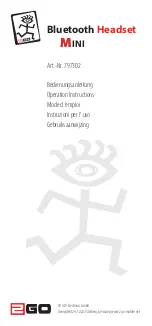
© 2015 Plantronics, Inc. Plantronics and Savi are trademarks of Plantronics, Inc. registered in the US and other countries. Internet Explorer,
Microsoft, Windows, Windows Vista, and Windows XP are either registered trademarks or trademarks of Microsoft Corporation in the United
States and/or other countries.DECT SECURITY is the trademark of DECT Forum. The trademark may only be applied to products with the
written license of DECT Forum. All other trademarks are the property of their respective owners.
Patents: US 7,633,963; 8,948,412; 9,008,319; D635,548; D635,962; D643834; BR DI70057630; DI70057796; CN ZL201030674530.7;
ZL201030710900.8; ZL201030710901.2; EM 001788878; 001792276; IN 233101; 233102; KR 30-655803; 30-655804; and TW D143596;
D143954; D143955.
83267-11 08.15
Plantronics, Inc.
345 Encinal Street
Santa Cruz, CA 95060
United States
Tel: 800-544-4660
plantronics.com
For product support contact us at plantronics.com/support.
FCC Part 15 Regulatory Information
DECLARATION OF CONFORMITY
We Plantronics, 345 Encinal Street, Santa Cruz, California, 95060 USA (800) 544-4660, declare under our
sole responsibility that the product D100 complies with Part 15 of the FCC Rules. Operation is subject to
the following two conditions: (1) this device may not cause harmful interference, and (2) this device must
accept any interference received, including interference that may cause undesired operation.
Note: This equipment has been tested and found to comply with the limits for a Class B digital device,
pursuant to part 15 of the FCC Rules. These limits are designed to provide reasonable protection against
harmful interference in a residential installation. This equipment generates, uses, and can radiate radio
frequency energy and, if not installed and used in accordance with the instructions, may cause harmful
interference to radio communications. However, there is no guarantee that interference will not occur in
a particular installation. If this equipment does cause harmful interference to radio or television reception,
which can be determined by turning the equipment off and on, the user is encouraged to try to correct the
interference by one or more of the following measures:
—Reorient or relocate the receiving antenna.
—Increase the separation between the equipment and receiver.
—Connect the equipment into an outlet on a circuit different from that to which the receiver is connected.
—Consult the dealer or an experienced radio/TV technician for help.
This equipment complies with FCC radiation exposure limits set forth for an uncontrolled environment.
Changes or modifications not expressly approved by the party responsible for compliance could void the
user’s authority to operate the equipment.
Industry Canada Regulatory Information
This Class B digital apparatus complies with Canadian ICES-003.
Cet appareil numérique de la classe B est conforme à la norme NMB-003 du Canada.
This device complies with Industry Canada licence-exempt RSS standard(s). Operation is subject to
the following two conditions: (1) this device may not cause interference, and (2) this device must accept
any interference, including interference that may cause undesired operation of the device. Le présent
appareil est conforme aux CNR d’Industrie Canada applicables aux appareils radio exempts de licence.
L’exploitation est autorisée aux deux conditions suivantes : (1) l’appareil ne doit pas produire de brouillage,
et (2) l’utilisateur de l’appareil doit accepter tout brouillage radioélectrique subi, même si le brouillage est
susceptible d’en compromettre le fonctionnement.
This equipment complies with IC radiation exposure limits set forth for an uncontrolled environment. Cet
équipement est conforme aux limites d’exposition de radiation IC énoncés pour un environnement non
contrôlé.
BC



























